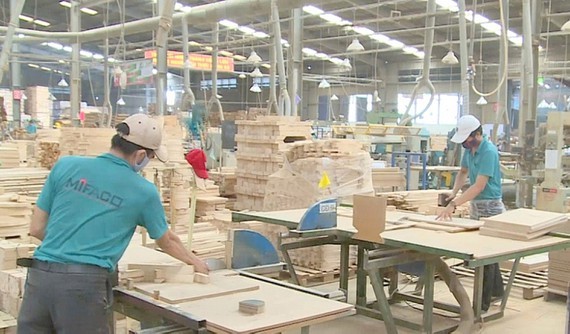 Furniture production at Minh Phat Wood Company in Binh Duong Province. (Photo: SGGP)
Furniture production at Minh Phat Wood Company in Binh Duong Province. (Photo: SGGP)
According to BIFA's report, in the first quarter of 2022, the production and business activities of its member enterprises increased by 42 percent over the same period in 2021, with many enterprises having good growth. Specifically, Trieu Phu Loc Production Company achieved about 30 percent of the year plan and rose by 15 percent over the same period; Truong Thanh Furniture Corporation achieved 94 percent of the year plan and increased by 70 percent over the same period in 2021; Thiet Dan Company achieved 94 percent of the year plan.
Explaining the growth rate of the wood industry over the past time, the Department of Industry and Trade of Binh Duong Province assessed that wood manufacturers had quickly adapted to the new state after the outbreak of the Covid-19 pandemic and they had actively taken advantage of opportunities from free trade agreements (FTAs). As a result, Binh Duong's wood products have been exported to many markets, with a competitive advantage. Especially, the effective EVFTA has a favorable impact on the Vietnamese wood industry when the tax rate is gradually reduced to zero percent.
However, according to BIFA Chairman Nguyen Liem, the wood industry is facing challenges as major consumer markets, namely the US and Europe, tend to decrease due to geopolitical fluctuations, difficulties after the social distancing to prevent the Covid-19 pandemic, and the US dollar depreciation. Therefore, the demand for wooden furniture is low because people prioritize shopping for other essential items.
According to a survey by BIFA, shortly, many wood processing factories in Binh Duong may not have orders for production, such as Karta Joint Stock Company and TPP One Company. Some enterprises have seen new contracts drop sharply compared to last year. For instance, Thinh Phat Tan Uyen Wood Trading & Production Company and An Khang Company Limited both have seen a decrease of 50 percent, and Interwood Company 40 percent.
According to a representative of a wood processing company, most enterprises are currently facing difficulties in input costs, such as gasoline, logistics costs, and coating chemicals, leading to an extremely-high product cost. Therefore, some enterprises limit receiving new orders if they cannot negotiate reasonable prices.
With the same concern, the leader of Minh Duong Wood Joint Stock Company in Thuan An City said that the company had signed export orders to the US and Europe until the end of the third quarter of this year. However, the costs were inflated highly, of which, service export fees climbed rapidly. Specifically, each container exported to Europe costs export fees of $6,000-$8,000, and $10,000-$12,000 to the US, putting more pressure on enterprises in negotiating to receive new orders in the last months of the year.
Explaining the growth rate of the wood industry over the past time, the Department of Industry and Trade of Binh Duong Province assessed that wood manufacturers had quickly adapted to the new state after the outbreak of the Covid-19 pandemic and they had actively taken advantage of opportunities from free trade agreements (FTAs). As a result, Binh Duong's wood products have been exported to many markets, with a competitive advantage. Especially, the effective EVFTA has a favorable impact on the Vietnamese wood industry when the tax rate is gradually reduced to zero percent.
However, according to BIFA Chairman Nguyen Liem, the wood industry is facing challenges as major consumer markets, namely the US and Europe, tend to decrease due to geopolitical fluctuations, difficulties after the social distancing to prevent the Covid-19 pandemic, and the US dollar depreciation. Therefore, the demand for wooden furniture is low because people prioritize shopping for other essential items.
According to a survey by BIFA, shortly, many wood processing factories in Binh Duong may not have orders for production, such as Karta Joint Stock Company and TPP One Company. Some enterprises have seen new contracts drop sharply compared to last year. For instance, Thinh Phat Tan Uyen Wood Trading & Production Company and An Khang Company Limited both have seen a decrease of 50 percent, and Interwood Company 40 percent.
According to a representative of a wood processing company, most enterprises are currently facing difficulties in input costs, such as gasoline, logistics costs, and coating chemicals, leading to an extremely-high product cost. Therefore, some enterprises limit receiving new orders if they cannot negotiate reasonable prices.
With the same concern, the leader of Minh Duong Wood Joint Stock Company in Thuan An City said that the company had signed export orders to the US and Europe until the end of the third quarter of this year. However, the costs were inflated highly, of which, service export fees climbed rapidly. Specifically, each container exported to Europe costs export fees of $6,000-$8,000, and $10,000-$12,000 to the US, putting more pressure on enterprises in negotiating to receive new orders in the last months of the year.
























